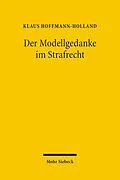Klaus Hoffmann-Holland analyzes individual methods of criminological research in pilot projects and answers the controversial question regarding penal restrictions on and opportunities for pilot projects.
Pilot projects have been a determining factor in the development of criminal law, the law of criminal procedure, criminal law relating to young offenders, in the execution of a sentence and in the imposition of sanctions. Klaus Hoffmann-Holland analyzes individual methods of criminological research in pilot projects and answers the controversial question regarding penal restrictions on and opportunities for pilot projects. The author shows the scope for pilot projects in criminal law, for example for the testing of the so-called "baby flap", to which mothers in Germany can bring their newborn babies anonymously if they are unable to care for them, as well as measures of "harm reduction" in the law governing the use and traffic of drugs (giving injections, controlled handing out of heroin for the treatment of drug addicts, control of drug content). Here it is important to differentiate between the legal means for pilot projects on the basis of statutory testing stipulations and those means which are based on practical initiatives. In the latter case, a result-oriented teleological interpretation makes it possible to consider socio-scientific approaches in legal science.
Autorentext
Studium in Saarbrücken, Marburg und Gießen; 2000 Promotion; 2005 Habilitation; Tätigkeiten als Richter und Staatsanwalt in Rheinland-Pfalz; 2013 Ernennung zum Vorsitzenden Richter am Landgericht Berlin; 2014-22 Vizepräsident der Freien Universität Berlin; Universitätsprofessor für Kriminologie und Strafrecht am Fachbereich Rechtswissenschaft der Freien Universität Berlin; Lehr- und Forschungsaufenthalte u.a. an der University of Warwick, der École normale supérieure in Paris, der Johannes Kepler Universität Linz und der Université de Strasbourg, als Gastprofessor am Center for Transnational Legal Studies London, an der Hebrew University of Jerusalem und der Nihon University Tokyo sowie als Adjunct Professor am Georgetown University Law Center.
Pilot projects have been a determining factor in the development of criminal law, the law of criminal procedure, criminal law relating to young offenders, in the execution of a sentence and in the imposition of sanctions. Klaus Hoffmann-Holland analyzes individual methods of criminological research in pilot projects and answers the controversial question regarding penal restrictions on and opportunities for pilot projects. The author shows the scope for pilot projects in criminal law, for example for the testing of the so-called "baby flap", to which mothers in Germany can bring their newborn babies anonymously if they are unable to care for them, as well as measures of "harm reduction" in the law governing the use and traffic of drugs (giving injections, controlled handing out of heroin for the treatment of drug addicts, control of drug content). Here it is important to differentiate between the legal means for pilot projects on the basis of statutory testing stipulations and those means which are based on practical initiatives. In the latter case, a result-oriented teleological interpretation makes it possible to consider socio-scientific approaches in legal science.
Autorentext
Studium in Saarbrücken, Marburg und Gießen; 2000 Promotion; 2005 Habilitation; Tätigkeiten als Richter und Staatsanwalt in Rheinland-Pfalz; 2013 Ernennung zum Vorsitzenden Richter am Landgericht Berlin; 2014-22 Vizepräsident der Freien Universität Berlin; Universitätsprofessor für Kriminologie und Strafrecht am Fachbereich Rechtswissenschaft der Freien Universität Berlin; Lehr- und Forschungsaufenthalte u.a. an der University of Warwick, der École normale supérieure in Paris, der Johannes Kepler Universität Linz und der Université de Strasbourg, als Gastprofessor am Center for Transnational Legal Studies London, an der Hebrew University of Jerusalem und der Nihon University Tokyo sowie als Adjunct Professor am Georgetown University Law Center.
Titel
Der Modellgedanke im Strafrecht
Untertitel
Eine kriminologische und strafrechtliche Analyse von Modellversuchen
Autor
EAN
9783161629365
Format
E-Book (pdf)
Hersteller
Veröffentlichung
01.07.2024
Digitaler Kopierschutz
Adobe-DRM
Dateigrösse
30.46 MB
Anzahl Seiten
317
Unerwartete Verzögerung
Ups, ein Fehler ist aufgetreten. Bitte versuchen Sie es später noch einmal.
